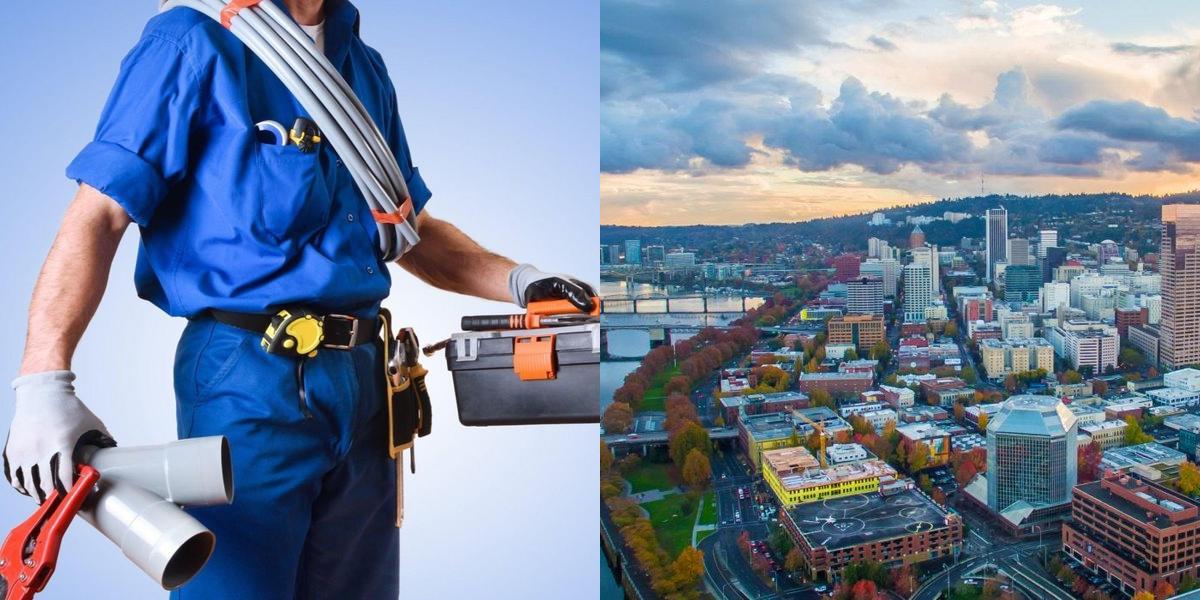How to Become a Plumber in Oregon

What is a Plumber?
A plumber is a skilled tradesperson who specializes in installing, repairing, and maintaining systems used for water, drainage, heating, and ventilation. They work with pipes, fixtures, and appliances to ensure proper functionality and safety in residential, commercial, and industrial settings.
Plumbers are responsible for:
- Reading blueprints and technical drawings
- Installing and repairing plumbing systems
- Testing and inspecting plumbing systems for leaks and other issues
- Troubleshooting and solving plumbing problems
- Collaborating with other construction professionals
- Ensuring compliance with building codes and regulations
2. Network within the industry
Networking is an effective way to find job opportunities in any industry, including plumbing. Attend industry events, join professional organizations, and connect with other plumbers or contractors in your area. Building relationships and making connections can lead to job leads or referrals.
3. Apply to plumbing companies
Research plumbing companies in your area and submit your resume and cover letter to their human resources department. Many plumbing companies are constantly looking for skilled and certified plumbers to join their team. Check their websites or job boards for any open positions or apprenticeship opportunities.
4. Consider joining a union
Joining a plumbing union can provide you with additional job opportunities, benefits, and support. Unions often have partnerships with contractors and can help connect you with potential employers. They also offer ongoing training and education to keep your skills up to date.
5. Start your own plumbing business
If you have an entrepreneurial spirit, starting your own plumbing business can be a rewarding career path. This option allows you to have more control over your work and potentially earn a higher income. However, keep in mind that starting a business requires additional skills and resources, such as marketing, accounting, and customer service.
Career Paths and Opportunities after Becoming a Plumber
Becoming a certified plumber opens up a variety of career paths and opportunities. Here are some of the options you can explore:
Journeyman Plumber
After completing your apprenticeship and obtaining your plumbing certification, you can work as a journeyman plumber. Journeyman plumbers are skilled professionals who can work independently and handle a wide range of plumbing jobs. They are responsible for installing, repairing, and maintaining plumbing systems in residential, commercial, and industrial settings.
Plumbing Contractor
With the necessary experience and skills, you can become a plumbing contractor and start your own business. As a contractor, you will be responsible for managing projects, hiring and supervising employees, and handling customer relations. Starting a plumbing business allows you to have more control over your work and potentially earn a higher income.
Plumbing Inspector
Another career path to consider is becoming a plumbing inspector. Plumbing inspectors are responsible for ensuring that plumbing systems comply with local regulations and building codes. They inspect various types of plumbing installations, issue permits, and enforce compliance. This role requires a deep understanding of plumbing codes and regulations.
Pipefitter
Pipefitting is a related field that focuses on installing and maintaining piping systems used in industrial settings, such as power plants, factories, and refineries. Pipefitters work with a variety of materials, including steel, copper, and plastic, and must be skilled at reading blueprints and using specialized tools.
HVAC Technician
Many plumbers also choose to specialize in heating, ventilation, and air conditioning (HVAC) systems. HVAC technicians install, repair, and maintain heating and cooling systems in residential, commercial, and industrial buildings. This specialization can open up additional job opportunities and increase your earning potential.
Green Plumbing Specialist
As environmental concerns continue to grow, there is a rising demand for green plumbing specialists. These professionals focus on installing energy-efficient plumbing systems and promoting sustainable practices. Green plumbing specialists may work on projects such as rainwater harvesting, greywater recycling, and solar water heating.
Final Thoughts
Becoming a certified plumber is a rewarding and lucrative career choice. By following the steps outlined above, you can obtain your certification, gain practical experience, and find job opportunities in the plumbing industry. Whether you choose to work as a journeyman plumber, start your own business, or specialize in a specific area, the skills and knowledge you acquire as a plumber will always be in demand.
Remember to continuously update your skills and stay up to date with plumbing codes and regulations to enhance your career prospects. With hard work, dedication, and a passion for the trade, you can build a successful and fulfilling career as a plumber.
Wondering if there's more? Perhaps these other articles will be more helpful if this one isn't exactly what you're after:

Winlynd Caballero is a member of Dreambound's Sales team. She helps in handling the company's finullcial transactions, generating reports, and school sales. Beyond her responsibilities in the realm of numbers and business, Winlynd finds herself deeply immersed in a world of art and music.



